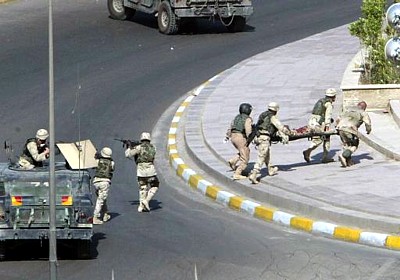U.S. Commander Warns Against Iraq Timetable

The commander of U.S. forces in the Middle East today cautioned against beginning a phased withdrawal of troops from Iraq and recommended that current troop levels be maintained, but he said that all options remain open, including a "temporary" increase to help the Iraqi army become more effective.
Army Gen. John P. Abizaid, who heads the U.S. Central Command, told a Senate panel that U.S. commanders on the ground and the government of Prime Minister Nouri al-Maliki both oppose the idea of significantly boosting U.S. forces in Iraq to help deal with intensifying sectarian violence. The U.S. commanders view such an option as contradicting their efforts to place more responsibility on Iraqi forces, and Maliki has told him it would undermine the government's authority, Abizaid said.
Nevertheless, the general held out the prospect that the U.S. troop levels may need to go up in order to bolster the U.S. "military transition teams" that are "embedded" with Iraqi forces.
Abizaid and the top State Department coordinator for Iraq, David M. Satterfield, also warned the Senate Armed Services Committee that any move to partition Iraq along sectarian lines would lead to a bloodbath and likely result in a safe haven for the al-Qaeda terrorist network in an area controlled by Iraq's Sunni Muslim minority.
Abizaid ran into tough questioning from Democrats, who favor a "phased redeployment" of U.S. troops out of Iraq and are poised to take control of the Senate by a narrow majority following last week's midterm elections. But some of the sharpest questioning came from Republican Sen. John McCain of Arizona, who advocates increasing the number of U.S. troops in Iraq to deal with the sectarian violence, crush the insurgency and avert civil war.
In response to questions from Sen. Lindsey O. Graham (R-S.C.) and McCain, Abizaid acknowledged that the United States should have sent more troops into Iraq to carry out an effective occupation immediately after deposing the government of Saddam Hussein, as advocated shortly before the U.S. invasion by Gen. Eric K. Shinseki, then the Army chief of staff. Shinseki told the Senate Armed Services Committee in February 2003 that "something on the order of several hundred thousand soldiers" would be needed for the occupation, an estimate that drew rebukes from Defense Secretary Donald H. Rumsfeld and his then-deputy, Paul D. Wolfowitz.
Asked by Graham whether Shinseki was correct, Abizaid said, "General Shinseki was right that a greater international force contribution, U.S. force contribution and Iraqi force contribution should have been available immediately after major combat operations."
He said more troops are needed in Iraq now, but that they should be Iraqi.
"I do not believe that more American troops right now is the solution to the problem," he said. "I believe that the troop levels need to stay where they are. We need to put more American capacity into Iraqi units to make them more capable in their ability to confront the sectarian problem."
He added, "It is possible that we might have to go up in troop levels in order to increase the number of forces that go into the Iraqi security forces. But I believe that's only temporary."
Abizaid later told McCain, "I think that you can look back and say that more American troops would have been advisable in the earlier stages of May, June, July" of 2003, in the aftermath of the March 2003 invasion and the toppling of Hussein in early April. But he said he has asked the top U.S. commanders in Iraq whether more American troops are needed now, "and they all said no."
The Central Command chief continued, "And the reason is, because we want the Iraqis to do more. It's easy for the Iraqis to rely upon to us do this work. I believe that more American forces prevent the Iraqis from doing more, from taking more responsibility for their own future. They will win the insurgency. They will solve the sectarian violence problem. And they'll do it with our help. If more troops need to come in, they need to come in to make the Iraqi army stronger."
Read the rest at the Washington Post
Related Link:
New Iraq deployments could stretch Reserve Force
Related Link:
Bush: Commanders Say Iraq Troop Level OK
Related Link:
Army seeks to increase rotation through reassignment of specialists to 'high-demand roles'
Related Link:
Report: U.S. building massive permanent base in north Iraq
Related Link:
Marines plan recalling reserve combat battalions for 2nd tours in 2008
Related Link:
Secretary of AF: Airmen to remain in Iraq past 2010
Related Link:
Army: Troops to stay in Iraq until 2010
Related Link:
Expert: Iraq army has only 50% chance of success, no U.S. troop reductions foreseeable

<< Home